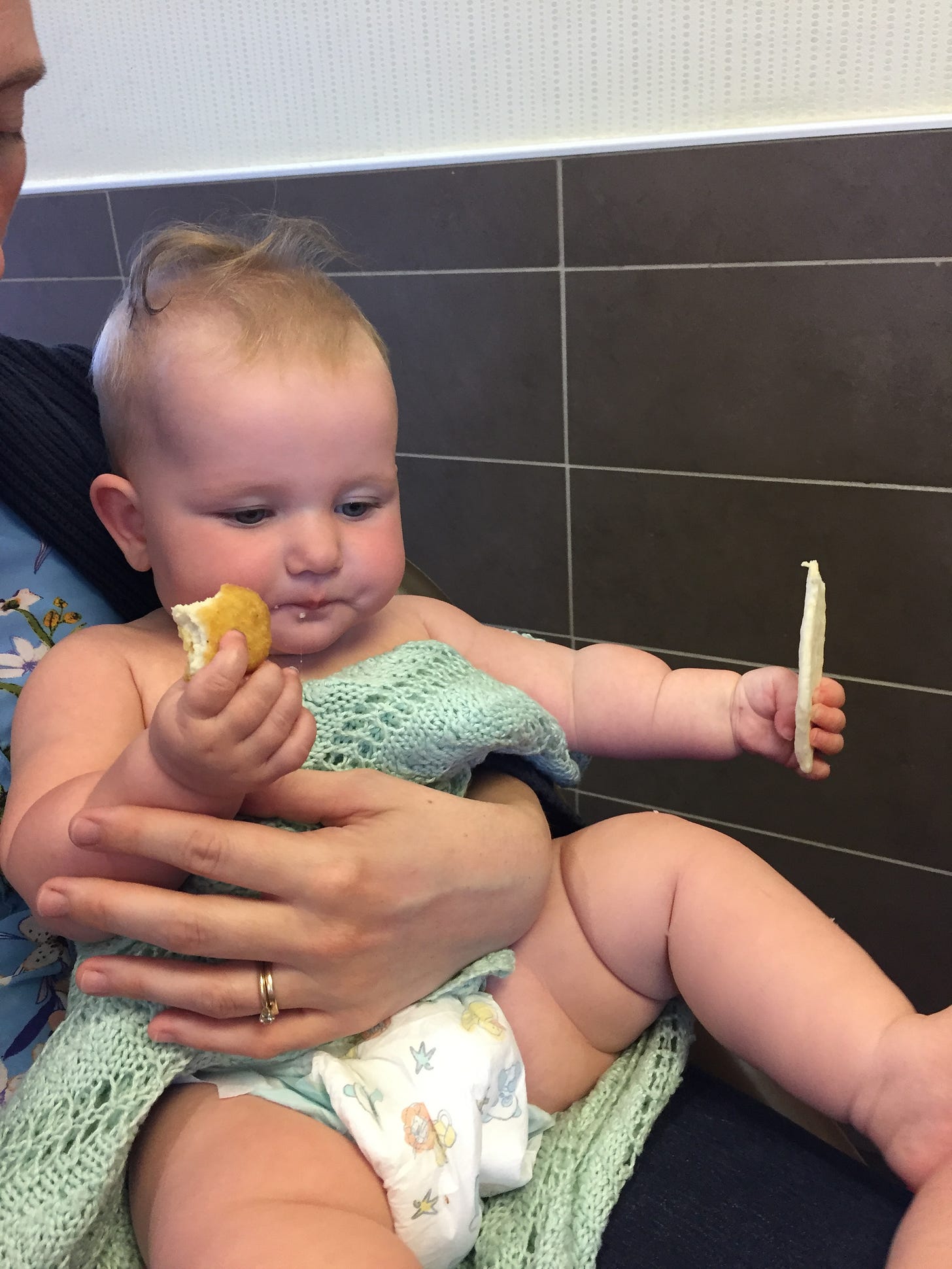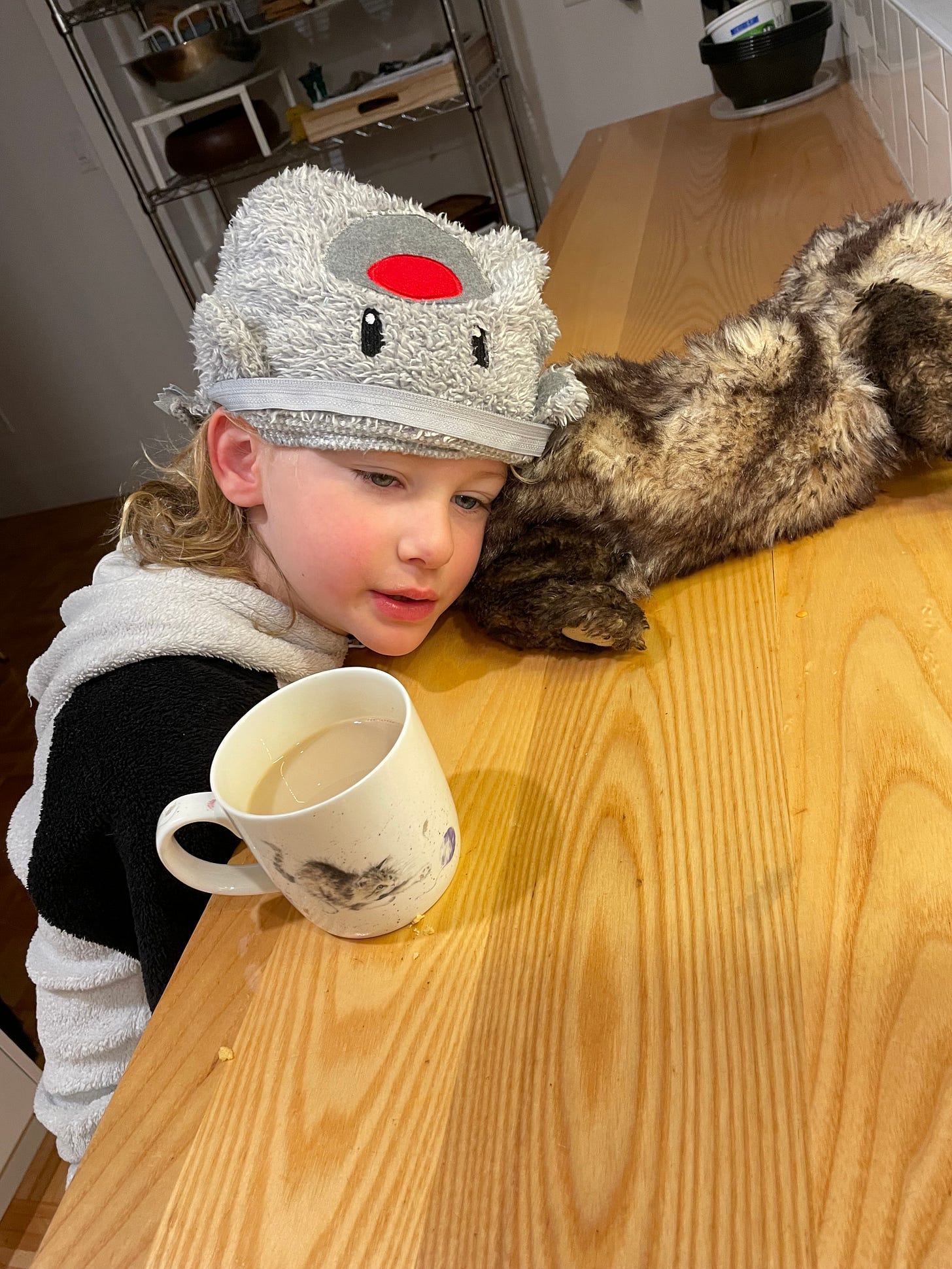Fart the Ferret's Morning Routine
My fourth daughter, Rachel, was born on the second-last day of 2018. She subsequently did not sleep for more than two hours in a row until halfway through 2020. Both of these historical details were surprising because we had referred to Rachel as “Baby Dinan 2019” for the entirety of Vivien’s pregnancy and because we considered ourselves expert sleep trainers, since our three previous daughters had all slept through the night by three months old.1 Throughout her young life, Rachel has defied our expectations with almost alarming consistency.
We have been much more relaxed with Rachel than we were with our first three kids. As a baby, our eldest daughter, Joanna, for instance, was the only child of a couple of twenty-four-year-old doctoral students. She wore cloth diapers, her every garment bespoke and lovingly made from ethically sourced organic cotton. She ate no sugar until age two, and was indulged with a bevy of age-inappropriate lessons, clubs, and other educational experiences and opportunities. Rachel was born over a decade later to two settled professionals in their thirties with three older kids. I have this indelible image of Rachel at about a year old, naked except for a paper diaper, double fisting nugs and mum-mums in a Quebec McDonalds. This is, more or less, how it’s gone.
But I think she has benefitted from our experience. When we weren’t suffering from sleep deprivation, we have parented her with confidence and poise. Rachel is consequently very comfortable in the world: Imagine growing up in a household where, at any time, at least five people are around who simply adore you, will cater to your every desire. My amateur sociology indicates that you want to be friends with the Rachels of the world—beloved children raised by loving experts. The loving security she has at home allows her to move through the world with a certain winsome ease. On the first day of school she observed one of her future classmates rolling around on the ground crying when confronted with the reality of separation from mom. Observing this scene, Rachel turned to me and said, “Ok dad—you can go now. I love you. Bye-bye!,” before stepping over this other child and getting in line. She didn’t look back. Later in the day, I got a note from the kindergarten teacher that she had befriended this other child, and was telling her about how much fun kindergarten was going to be, how much they’d learn, how many friends they’d all get to make.
In other ways, being the baby in a big family has its own set of perils. We didn’t, for instance, pick up on the fact that Rachel needed glasses despite her tendency to smush her face into the iPad when watching cartoons and her unfortunate penchant for running into walls.
Last year she threw an enormous, uncharacteristic tantrum, which I duly ignored. As an ultimatum, she threatened to poop on the floor unless I acquiesced to her (frankly unclear) demands. When I stayed calmly resolute, she locked eyes with me, dropped her pants, and went for the big finish. “Daddy,” she told me with evident self-satisfaction (and, given the size of the specimen, I’d say considerable relief) “I pooped on the floor.” “Rachel,” I replied, “that’s too bad, because now you’re not going to get to watch any Bluey for two days.” She was incensed. As I gave her a bath, she tried to bite me, told me she hated me, and then, defeated, succumbed to what can only be called an angry nap. Between us, it didn’t even crack the top-ten tantrums I have had to defuse. She’s never, by the way, tried anything like that again.
As I already mentioned, Rachel started kindergarten a few weeks ago. I am an emotional person, but I am not the sort of parent who gets too worked up about milestones in the lives of our children. An abstract idea like “our baby is growing up!” does not upset me. I know she’s growing up because every few months we have to, for instance, give away a Rubbermaid Roughneck Tote filled with size 4 clothes and retrieve the one with the size 4T clothes from storage.
Getting too upset about their growth is, in my view, a little unfair to your kids. Rachel shouldn’t have to bear the brunt of the fact that I’m pushing forty and reckoning with my own mortality. It’s good that your kids grow up, and you should avoid making their incipient maturation about you. People do not like this observation, as my friend Mary Townsend learned from the furious responses she received to a thoughtful piece called “Why It’s Okay to Throw Your Children’s Art Away.”2
In the domain of ideas, I wonder sometimes about writing about my kids or about “being a dad” in a general sense. Is it possible to do? Of course I am writing about myself when I do so. But what else can I do? I myself am the subject of my essays—and however frivolous and vain this may be, it’s my best ingress into talking about things of more general concern. I think being upfront about the limitations of the essay is the key to militating against these limitations.
Much of the “parent essay” genre shows none of this awareness. The twin dangers of “parent writing” are related: on the one hand, there is a tendency to be saccharine and sentimentalizing as a sort of preemptive defence of the decision to procreate, which is a distortion of the phenomenon under examination. On the other hand, the self-exculpatory “honest” essays where the writer is trying to get readers to give them permission to indulge their worst instincts are surely just as bad.3 It’s much harder to find assessments that try to avoid both of these flaws, because I think parents don’t have much time and space to gain intellectual purchase on the cliffs of their experience as the work their way up. But I find trying to take my own emotions out of it a good place to start: the best essays try to give you the phenomena, and do this not by excising the lens of the essayist’s perspective, but by being aware of how it is prone to distort. In parental writing, my approach here is to take advantage of a distance which, to be honest, I find painful, in order to gain and thus provide some perspective. As it happens, I think what is good for writing is also good for parenting.
As expected, Rachel is doing very well in school. But she has recently started doing something a little bit… funny. It verges on the sort of situation which, if our older children had done it, would have launched us into immediate anxious catastrophization and consultation with experts about whether some more serious intervention were called for. It’s probably fine, though, and I think it’s too funny, too excellent, to keep to myself. So I’m going to try to present the facts of the case as I see them, and try to think about what they mean.
Every morning when she wakes up, Rachel alights from bed accompanied by a toy ferret—a puppet—which she has named “Fart.”4 For about the first thirty minutes or so of every morning if we want to talk to Rachel, we need to go through Fart. Fart is difficult. He is saucy and irreverent in a way that Rachel—poop tantrum notwithstanding—usually is not. He is profane and vulgar, making many, you guessed it, fart jokes. I have to be very firm with Fart, and we have a standing agreement that if he is too rude, I will feed him cat food instead of his desired “ferret kibble” (a real product Rachel got her sister to research for her on the Internet). Fart asks questions on Rachel’s behalf, tells jokes, orders her breakfast, and laments, for example, that his ferret paws are “too short to give proper hugs.” Rachel sometimes wears him around her neck like a midcentury socialite might wear a mink stole. When she does, I like to borrow Roger Sterling’s quip from Mad Men: “Sorry, but I don’t know whose eyes to look at.” Without missing a beat Fart always replies: “Mine, silly!” Rachel recently had to tell him, rather crossly, that it was not appropriate for him to accompany her to the bathroom.
Fart sleeps in a toy pup tent—formerly belonging to an American Girl doll who has now fallen out of favour—on Rachel’s bed for most of the day, since Ferrets are, of course, predominantly nocturnal. Every day I learn something new about Fart’s history; how, for example, he proposed marriage to my daughter Ruth while I was in Denmark, or how Rachel discovered he was a rational ferret by “really listening to [him].” Fart is prone to fits of wanton, comedic aggression, caroming across the room striking us without notice. Despite his edge, he is ultimately an equanimous ferret, and the only thing he can’t tolerate is being held by somebody else.
My daughter Joanna claims to have invented Fart’s voice, but there’s no question that Rachel now “owns” the character. I’m accustomed to kids really committing to bits, but this is a new one, even for me. My wife and I are amused, but not at all worried. It is possible to get very important messages through to Rachel when Fart is around, provided you ask him to tell her, and Fart mostly appears when Rachel is waking up in the morning. I’m sure it’s relatively normal behaviour for a kid who is almost five.
Even if it’s not, while Fart is not exactly lovable himself, the fact that Rachel has invented him, and entertains her mother and me with his antics each morning, is highly lovable. I think that when people say they’re sad about their kids growing up, they’re being imprecise. You’re happy about your kids growing up, actually. What you’re sad about is your awareness that some morning in November of December Rachel is going to wake up with a bare hand. Fart will lose his brio, and will eventually be consigned to another Rubberneck Tote, bound for the Salvation Army. We’ll eventually remember and tell the story about our time with Fart, but Rachel will be slightly embarrassed about the period when he did the talking for her. So, it’s really not growing up that makes us sad, but the loss of this world, made up by these three people and one rational ferret in the warm, dark late summer mornings of 2023.
Yes, we were truly insufferable. But we were, at first, also pretty young, and it was nice to feel like we had something figured out. Who cares if other people had money, we had the virtue which made our kids sleep every night? I promise we have been amply punished for this smarmy hubris.
I’ve noticed that in writing about these sorts of issues as a man I get almost no pushback or criticism beyond things like: “I’m a dad and I don’t like The National.” That’s okay, man. You don’t have to like The National. Did we, by the way, need another The National album? Maybe they’re spending too much time around Taylor Swift.
I really liked Merve Emre’s recent review of the “Mom Rage” book, for just this reason: https://www.newyorker.com/magazine/2023/09/25/mom-rage-the-everyday-crisis-of-modern-motherhood-minna-dubin-book-review
Fart the Ferret is actually not the first toy ferret we have had in our household. When we were in grad school, someone gave a stuffed ferret to baby Joanna, which she loved. Vivien had an excellent professor named Professor Ferreter (pronounced “ferret-er”) whose name I mistakenly pronounced “Ferreté.” We consequently named the stuffed ferret Professor Ferreté.



Loved your essay very entertaining